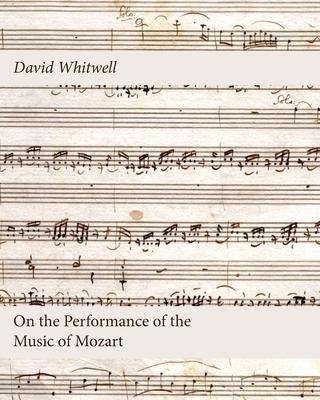Dr Whitwell's studies of Mozart began with his Ph.D. dissertation (1963) on the early symphonies of Mozart, which included an extensive study of pre-Classical composers and the early development of the sonata form. He was employed by Universal Edition in Vienna in 1968 to help prepare their Urtext edition of the first seven Mozart sonatas. He held private discussions at this time with Christa Landon, a Schubert authority; Alexander Weinmann in Vienna, the authority on early Viennese music prints; Ludwig Finscher, the authority on the Classical string quartet; and Franoise Lesure, Director of the Music Division of the National Library of Paris. While living in Vienna in 1968 Dr. Whitwell was credited as the discoverer of the vast body of eighteenth-century Harmoniemusik repertoire for eight winds, introducing this music with members of several professional octets, including those from the Stuttgart Radio Orchestra, the Vienna Symphony, the Brabant Orchestra, as well as the National Orchestra of Peru in Lima, and the Los Angeles Philharmonic.
Dr. Whitwell has given workshops on Mozart performance practice at the Royal College of Music in London, the Conservatory of Music in Milano, in addition to clinics in Korea, Taiwan, Portugal, Germany, Austria, Switzerland, Hungary, Belgium and Spain. He has given a public address on Mozart's K. 375 at the University of Wisconsin and public lectures in Boston and in Buenos Aires, Argentina. He was the master teacher for a Chamber Music Festival in Santa Fe dedicated to the performance of Mozart's music.
David Whitwell has authored articles on Mozart manuscripts in leading journals, including Music & Letters, the Mozart Jahrbuch and the London Musical Times, which concerned the date of K. 361 and which was honored by its inclusion in the Garland Library of the History of Western Music, a 1985 collection of the most outstanding articles of musicology. Whitwell's work on the ''Gran Partita, '' K. 361, is acknowledged in the preface of the Library of Congress' publication of the facsimile of the autograph score (1976). He is credited with having discovered the proof that this partita has always been one single work and not two separate works, as suspected by many earlier scholars, and for discovering the measure to be omitted before the coda of the ''Romance'' movement.
This book discusses the basic idioms of central European performance in the music of the late Baroque through early Beethoven, which Dr. Whitwell considers fundamental to proper stylistic performance of Mozart's music.
